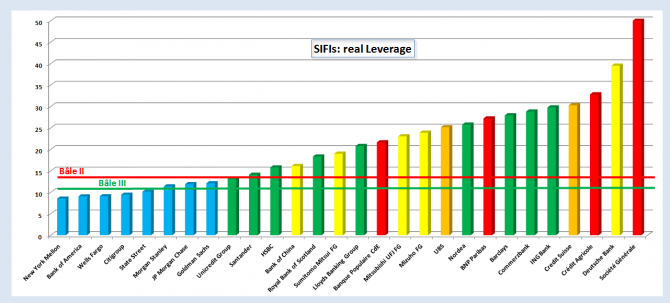Among the 28 officially identified Systemically Important Financial Institutions (SIFIs), there is a clear divide between the relatively low leveraged US banks, and some of their European peers, which are highly leveraged.
European banks are still in the process of deleveraging. They received significant help from the European Central Bank via the LTRO, and are expected to get an even bigger dose of stabilizing liquidity in the second operation due at the end of the month.
According to Jean-Pierre Chevallier, New York Mellon has the lowest leverage among this selected group of institutions, with a leverage of 8.5. Goldman Sachs closes the list of American banks with a leverage of 12.1.
On the side of the scale, French bank Société Générale closes the list, and it’s followed by Deutsche Bank. Germany’s largest bank is highly leveraged.
While Asia is showing growing economic strength and importance in recent years, only a handful of its banks are identified as systematically important.
It’s interesting to note that Italy’s Unicredit and Spain’s Santander are just behind US banks, high in the list. And on the other hand, Sweden’s Nordea, Holland’s ING and the two big Swiss banks are lower on the list.
You can see the full list at Chevallier’s site. He also provided this nice graph:
It’s important to note that different countries have different accounting methods, and so do different analysts. But even if European banks’ leverage is not as horrible, there is still a very clear gap between banks on both sides of the Atlantic.
Further reading: Greek Banks In Worse Shape Then Estimated

